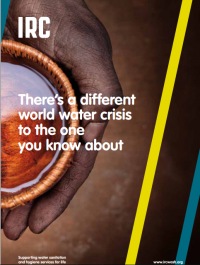Unlike droughts, floods and oil spills, non-functioning water and sanitation systems seldom make the headlines, even though water crises top the list of global risks.
Published on: 30/01/2015
 The greatest risk that will impact the world today is a decline in freshwater quality and quantity. At least, that's what the World Economic Forum (WEF) concluded when they quizzed 900 experts for the 2015 Global Risks report [1]. But there’s a different world water crisis to the one the WEF talks about. "Systems that should give people access to safe water and sanitation either don’t exist or are breaking down, on a massive scale, across the world" [2].
The greatest risk that will impact the world today is a decline in freshwater quality and quantity. At least, that's what the World Economic Forum (WEF) concluded when they quizzed 900 experts for the 2015 Global Risks report [1]. But there’s a different world water crisis to the one the WEF talks about. "Systems that should give people access to safe water and sanitation either don’t exist or are breaking down, on a massive scale, across the world" [2].
The WEF report assesses the likelihood and potential impact of 28 global risks and their interconnections over a period of 10 years. While water crises came eighth in the top 10 risks in terms of likelihood, they topped the list in terms of impact, ahead of the spread of infectious diseases, interstate conflict and failure of climate change adaptation. Unsafe drinking water and drought will damage human health and economic activity, the report says. The nexus of water, food, energy and climate change “is one of the overarching megatrends that will shape the world in 2030” [3].
Unlike droughts, floods and oil spills, non-functioning water and sanitation systems seldom make the headlines. Few people are aware that "one in three rural water systems in the developing world are not working" [2] or that many toilets built with government and donor funding are never used.
Luckily, there seems to be some sort of consensus that leadership is needed to solve both the water quality/quantity crisis and the "other crisis" related to the failure of services. In a series of blogs published last year, IRC CEO Patrick Moriarty discusses why government leadership and public financing are crucial to creating water and sanitation services that last: read Tools for life; The elephant in the room; and No more fairy tales.
Work in responsive way with gvt is long & frustrating but we must if we want system change & get service deliv approach moving @susannasmets
— Ingeborg Krukkert (@ikrukkert) January 28, 2015There is new hope that the international community will finally tackle both the known and the lesser known water crises. That hope is embodied in the proposed UN Sustainable Development Goals (SDGs).
It so happens that the implications of the proposed SDGs for the water and sanitation sector is the topic of the next IRC event on March, 4th in The Hague. If you want to register or be kept informed about the outcomes please contact us at communications@ircwash.org.
Notes:
[1] World Economic Forum, 2015. Global risks 2015. Geneva, Swizerland: World Economic Forum. Available at: https://reports.weforum.org/global-risks-2015/
[2] IRC, 2014. There's a different world water crisis to the one you know about. (brochure). The Hague, The Netherlands: IRC. Available at: http://www.ircwash.org/sites/default/files/about_irc_brochureweb_2.pdf
[3] Brabeck-Letmathe, P. and Ganter, C., 2015. Water crises are a top global risk. Agenda - The World Economic Forum, 16 Jan 2015. Available at: https://agenda.weforum.org/2015/01/why-world-water-crises-are-a-top-global-risk/
At IRC we have strong opinions and we value honest and frank discussion, so you won't be surprised to hear that not all the opinions on this site represent our official policy.